Massie Surname Ancestry ResultsOur indexes 1000-1999 include entries for the spelling 'massie'. In the period you have requested, we have the following 205 records (displaying 1 to 10): Single Surname Subscription | | | Buying all 205 results of this search individually would cost £1,118.00. But you can have free access to all 205 records for a year, to view, to save and print, for £100. Save £1,018.00. More... |
These sample scans are from the original record. You will get scans of the full pages or articles where the surname you searched for has been found. Your web browser may prevent the sample windows from opening; in this case please change your browser settings to allow pop-up windows from this site. Tenants, founders and incumbents of Lancashire chantries
(1546-1554)
Chantries were established to perform services for the souls of their founders and other faithful dead, including annual obits and anniversaries at which alms were usually distributed. The chantries could be at an existing altar in a parish church, a new altar in a side chapel of an existing church, in a new chapel in the churchyard or some miles from an existing church: few were founded before 1300, and most date from 1450 to 1500. Hospitals were places provided by similar foundations to receive the poor and weak; there were also religious guilds, brotherhoods and fraternities, and colleges (like large chantries at which three or more secular priests lived in common). An Act of Parliament of 1545 gave king Henry VIII the power to dissolve such chantries, chapels, &c., the proceeds to be devoted to the expenses of the wars in France and Scotland. Commissioners were appointed 14 February 1546 to survey the chantries and seize their property, and from 1546 to 1548 the commissioners produced these certificates giving brief details of the establishment and nature of each foundation, with an inventory of valuables and rental of lands. The individuals named in the certificates are thus the founder, the present incumbent, and the tenants whose rents provided the chantry's income. All the surviving certificates for Lancashire were edited by the Reverend F. R. Raines for the Chetham Society, and published from 1862.MASSIE. Cost: £6.00.  | Sample scan, click to enlarge

| Cheshire Knights, Esquires, Gentlemen and Freeholders: Bucklow hundred
(1578)
This muster roll, dated 7 October 20 Elizabeth 1578, is entitled 'A booke conteyni'ge the numbre and names of all the knights, esquiers, and gent'm wth freehoulders wthin the countie of Chester, togethers wth their horses, armor and other furnyture of proporc'on beinge also devyded into seurall hundreds accordinge to their peculiar habitac'ons'. Full names are given, with the details of the horsemen, archers, arms and armour each was required to furnish. There are returns from all seven hundreds of the county - Broxton (Broxon), Bucklow (Buckley), Eddisbury (Edisburie), Macclesfield (Mackesfeilde), Nantwich (Namplewiche), Northwich (Northwicke) and Wirral. Bucklow hundred included Altrincham, Knutsford and Runcorn.MASSIE. Cost: £4.00.  | Sample scan, click to enlarge
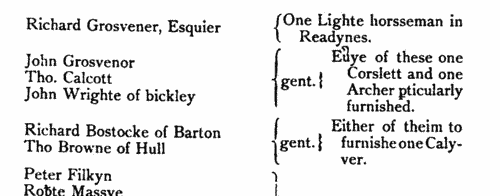
| Cheshire Knights, Esquires, Gentlemen and Freeholders: Wirral hundred
(1578)
This muster roll, dated 7 October 20 Elizabeth 1578, is entitled 'A booke conteyni'ge the numbre and names of all the knights, esquiers, and gent'm wth freehoulders wthin the countie of Chester, togethers wth their horses, armor and other furnyture of proporc'on beinge also devyded into seurall hundreds accordinge to their peculiar habitac'ons'. Full names are given, with the details of the horsemen, archers, arms and armour each was required to furnish. There are returns from all seven hundreds of the county - Broxton (Broxon), Bucklow (Buckley), Eddisbury (Edisburie), Macclesfield (Mackesfeilde), Nantwich (Namplewiche), Northwich (Northwicke) and Wirral. MASSIE. Cost: £4.00.  | Sample scan, click to enlarge
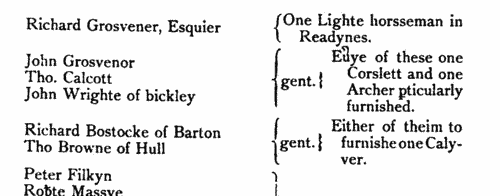
| Cecil Manuscripts
(1572-1582)
Letters and papers of William Cecil lord Burghley, Lord Treasurer. Includes some other material as early as 1553.MASSIE. Cost: £4.00.  | Sample scan, click to enlarge
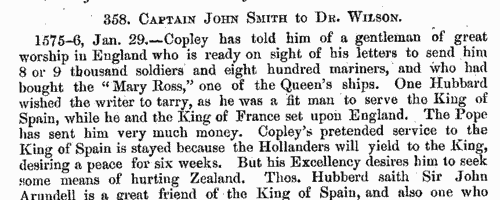
| Citizens of Oxford
(1509-1583)
These selections from the Oxford city records were printed in 1880 under the direction of the Town Clerk. Much of the material comes from the council minutes: 24 common councillors were elected out of the citizens at large each 30 September. Apart from the general administration of the city, a large number of cases involve people brought before the Council for using improper language, or other misbehaviour. There is an almost unbroken series of hanasters, or admissions to freedom of the city, listing the names of those who by purchase, birth or apprenticeship were admitted to the guild merchant.MASSIE. Cost: £4.00.  | Sample scan, click to enlarge
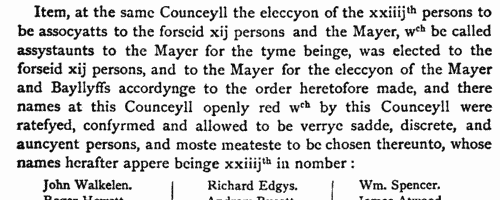
| Scottish litigants, rebels and cautioners
(1585-1592)
The Privy Council of Scotland exercised a superior judicial authority in the kingdom, and consequently received and dealt with a constant stream of petitions, as well as dealing with the internal security of the state. This register of the council from 1 August 1585 to 31 July 1592, in the reign of king James VI, was edited by David Masson, and published under the direction of the Lord Clerk Register of Scotland in 1881. Some of the individuals mentioned are the complainants, those of whom they complained, and the sureties on both sides: at this period, some of the complainants are alleging serious attacks, often of a feuding nature. Many of the bonds entered into by the cautioners are promises to keep the peace towards such enemies. Failure to answer to the council when summoned was a serious contempt, leading to being denounced a rebel, with serious consequences. But 'horning' was also used in the pursuit of debts: there was no imprisonment for debt in Scotland, but a creditor could have an obstinate debtor ordered, in the sovereign's name, to pay what was due, failing which, the debtor could be put to the horn, denounced as a rebel, and imprisoned as a rebel. The main text (to page 774) is from the Acta Secreti Concilii, containing the minutes of the Privy Council, with intermixed Acta Proper (political edicts), Decreta (judicial decisions), Acta Cautionis (acts of caution) and Bands (registration of bonds). After that are printed some miscellaneous Privy Council documents from the same years: additional acts of caution (775-778); ordinances and acts anent the Borders and the North (779-814); and miscellaneous privy council papers (815-834). The sources most productive of names, the Acta Cautionis and Registration of Bands, are also the most repetitive in form, and are not transcribed verbatim and literatim: nevertheless, one of the editor's rules was for 'All proper names and names of places occurring in the originals to be preserved in the abstracts without exception, and in the exact original spelling.'
MASSIE. Cost: £4.00.  | Sample scan, click to enlarge

| Inhabitants of Manchester
(1597)
The Court Leet and View of Frankpledge of the manor of Manchester in Lancashire was held twice a year on the first Thursdays after Easter and Michaelmas. The record of each court starts with a list of the jurors, and then records the deaths of tenants and burgesses, with the names of their heirs, who were to do suit to the court; and transfers of burgages by sale, and homage of new burgesses. Then there are presentments of all manner of minor enroachments and misdemeanours, such as blocking of ditches, stopping of highways, noisome drains, &c. Finally there are new general ordinances, often with the appointment of officers to see that they are enforced. The sample scan is taken from 1597. This index covers the court of 31 March 1597, including enquiries into encroachments held on 5 April 1597 and 13 June 1597.MASSIE. Cost: £6.00.  | Sample scan, click to enlarge
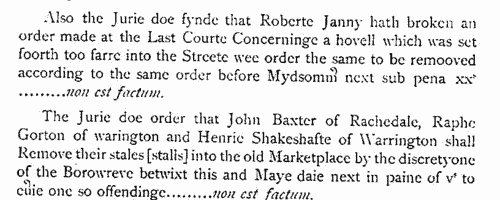
| Salford Portmote
(1598)
The earliest surviving records of the portmote of the borough of the township and manor of Salford in Lancashire were transcribed and edited by J. G. de T. Mandley and published by the Chetham Society in 1902. The court was held after Easter and Michaelmas each year. The record usually starts with a list of jurors, sometimes with a general suit roll. Officers are appointed in the autumn court - borough reeve, constables, miselayers, burleymen, alefounders, scavengers, and overseers for the pump. Where a freeholder had died since the previous court, an inquiry was made as to his or her heir. There are presentments of minor offences, particularly affrays and selling ale contrary to statute. 10 October 1598MASSIE. Cost: £4.00.  | Sample scan, click to enlarge
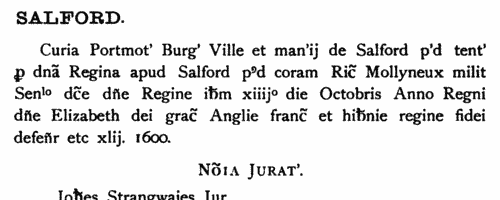
| Salford Portmote
(1599)
The earliest surviving records of the portmote of the borough of the township and manor of Salford in Lancashire were transcribed and edited by J. G. de T. Mandley and published by the Chetham Society in 1902. The court was held after Easter and Michaelmas each year. The record usually starts with a list of jurors, sometimes with a general suit roll. Officers are appointed in the autumn court - borough reeve, constables, miselayers, burleymen, alefounders, scavengers, and overseers for the pump. Where a freeholder had died since the previous court, an inquiry was made as to his or her heir. There are presentments of minor offences, particularly affrays and selling ale contrary to statute. 9 October 1599MASSIE. Cost: £4.00.  | Sample scan, click to enlarge
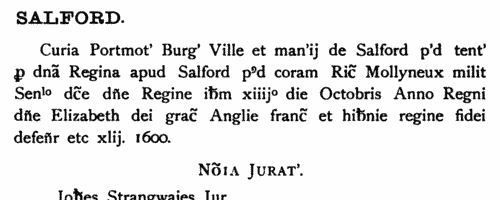
| Salford Portmote
(1600)
The earliest surviving records of the portmote of the borough of the township and manor of Salford in Lancashire were transcribed and edited by J. G. de T. Mandley and published by the Chetham Society in 1902. The court was held after Easter and Michaelmas each year. The record usually starts with a list of jurors, sometimes with a general suit roll. Officers are appointed in the autumn court - borough reeve, constables, miselayers, burleymen, alefounders, scavengers, and overseers for the pump. Where a freeholder had died since the previous court, an inquiry was made as to his or her heir. There are presentments of minor offences, particularly affrays and selling ale contrary to statute. 14 October 1600MASSIE. Cost: £4.00.  | Sample scan, click to enlarge
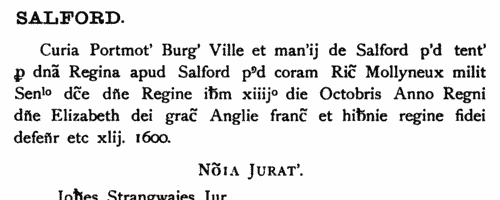
|
Research your ancestry, family history, genealogy and one-name study by direct access to original records and archives indexed by surname.
|












